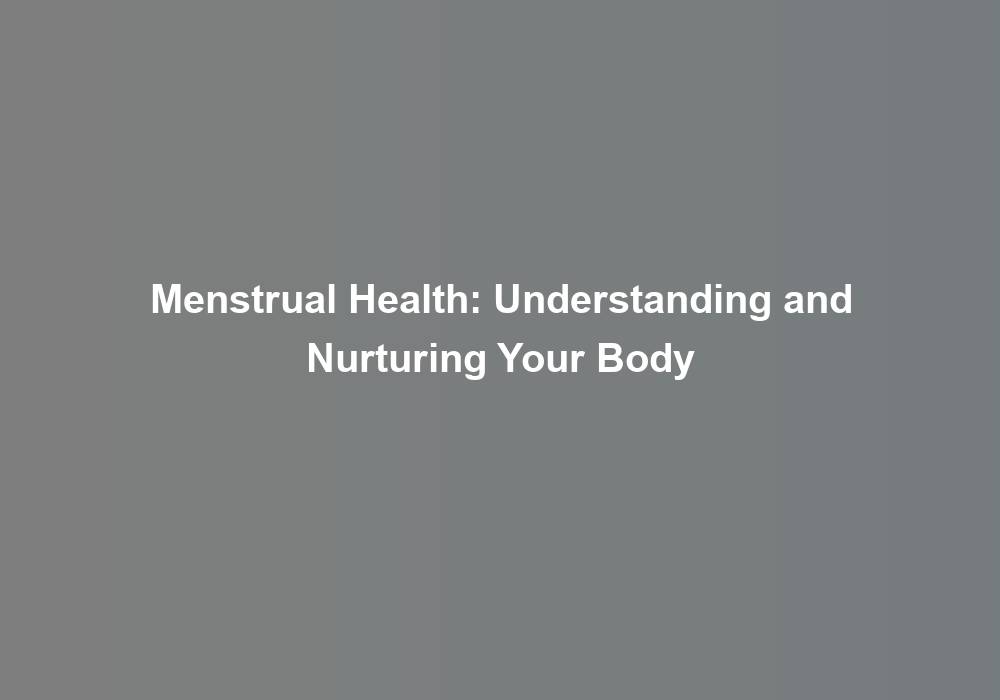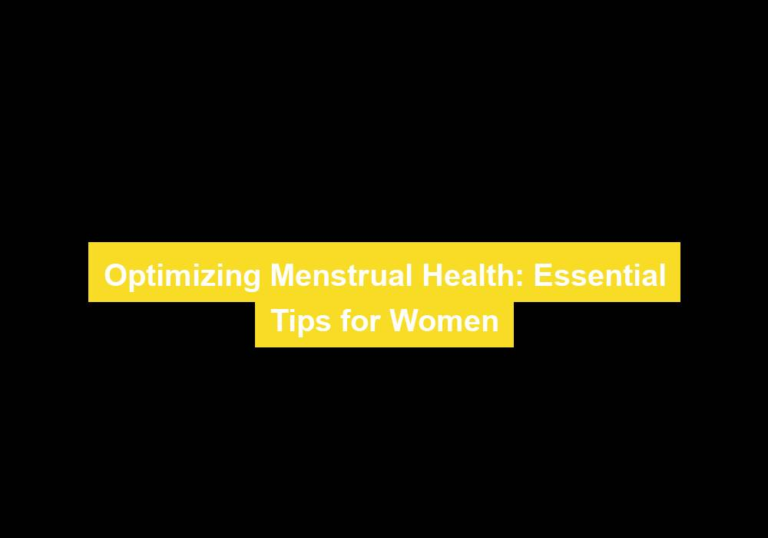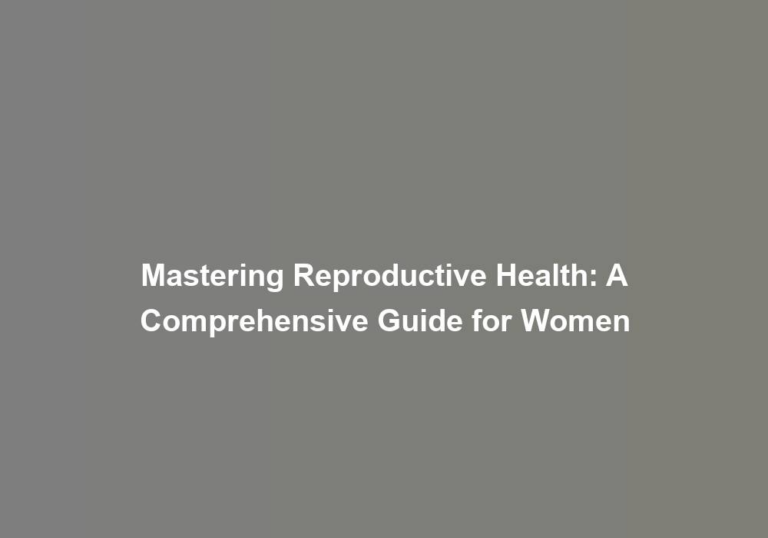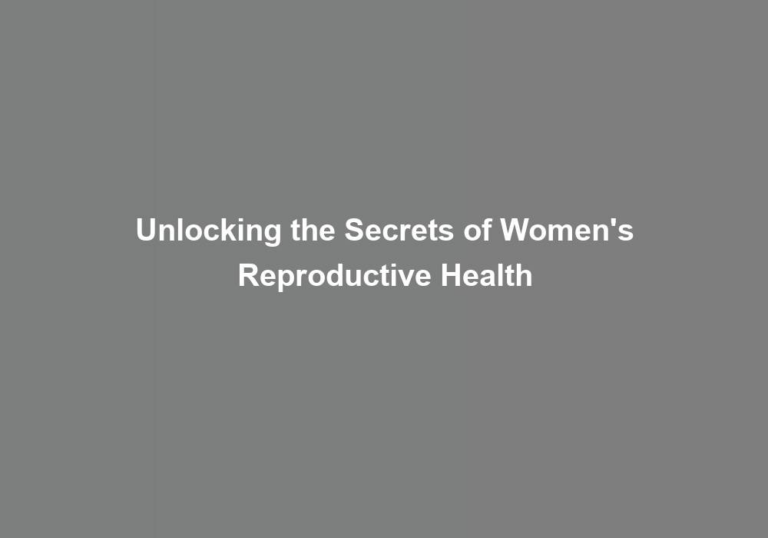Menstrual Health: Understanding and Nurturing Your Body
Do you ever find yourself struggling with severe menstrual cramps that interfere with your daily activities? ItG??s a common experience for many women, but itG??s essential to understand that painful periods are not normal. There may be underlying issues that need attention. Taking a closer look at your menstrual health can provide valuable insights into your overall well-being. Understanding the intricacies of your menstrual cycle and nurturing your body can lead to improved health and vitality.
Menstrual Cycle Basics
Understanding your menstrual cycle is key to taking control of your reproductive health and overall well-being. The menstrual cycle is a complex, yet beautifully orchestrated, series of events that your body experiences each month. It involves the ovulation process, where an egg is released from one of your ovaries, and the menstrual flow, which is the shedding of the uterine lining if the released egg isnG??t fertilized.
Ovulation is a crucial part of the menstrual cycle. ItG??s when your body releases an egg, making it available for fertilization. This typically occurs around the middle of your cycle, although the exact timing can vary from person to person. Understanding when you ovulate can be helpful if youG??re trying to conceive or avoid pregnancy because itG??s the most fertile time in your cycle.
Menstrual flow, often referred to as your period, is the result of the uterine lining shedding when pregnancy doesnG??t occur. This usually lasts around 3-7 days. ItG??s normal for the flow to vary in color and consistency throughout your period. While itG??s a natural process, it can sometimes be accompanied by uncomfortable symptoms like cramps, bloating, or mood swings.
Understanding these aspects of your menstrual cycle can help you feel more in tune with your body and its rhythms. ItG??s essential to embrace this natural process as a part of your overall health and well-being. Remember, youG??re not alone in experiencing these changes each month.
Hormonal Imbalances
If youG??ve been experiencing irregular periods, unexplained weight changes, or persistent acne, you may be dealing with hormonal imbalances. Understanding hormonal regulation is crucial for maintaining reproductive health. Hormones play a key role in regulating the menstrual cycle, fertility, and overall well-being. When your hormones are imbalanced, it can impact various aspects of your health and daily life.
| Common Signs of Hormonal Imbalances | Potential Hormonal Imbalance | What to Do |
|---|---|---|
| Irregular periods | Estrogen and progesterone imbalance | Consult a healthcare provider for evaluation and guidance |
| Unexplained weight changes | Thyroid hormone imbalance | Seek medical advice and consider thyroid function testing |
| Persistent acne | Androgen excess | Talk to a dermatologist or endocrinologist for personalized treatment options |
Experiencing any of these symptoms can be frustrating and affect your self-esteem. ItG??s important to remember that seeking help and understanding your body is a positive step towards nurturing your overall well-being. Hormonal imbalances are common and treatable, and you donG??t have to face them alone. Your healthcare provider can help identify the root cause of your symptoms and work with you to develop a personalized plan for hormonal regulation.
Nutritional Support
Dealing with hormonal imbalances can be challenging, but one important aspect of managing your reproductive health involves considering the role of nutrition and how it can support your bodyG??s hormonal balance. A balanced diet plays a crucial role in supporting your menstrual health. Ensuring that you consume a variety of nutrient-dense foods such as fruits, vegetables, whole grains, lean proteins, and healthy fats can positively impact your hormonal balance.
In addition to a balanced diet, dietary supplements can also provide valuable support. For example, omega-3 fatty acids found in fish oil supplements have been shown to help reduce period pain and inflammation. Similarly, magnesium supplements can assist in alleviating PMS symptoms, including bloating and mood swings. However, itG??s important to consult with a healthcare professional before incorporating any new supplements into your routine to ensure they are suitable for your individual needs.
Furthermore, certain nutrients such as vitamin D and calcium are essential for bone health, which can be particularly important during menstruation. Including foods rich in these nutrients, like dairy products, leafy greens, and fortified cereals, can contribute to overall menstrual well-being.
Lifestyle and Stress Management
Taking proactive steps to manage your lifestyle and reduce stress can significantly impact your menstrual health and overall well-being. ItG??s important to recognize the mind-body connection and the influence of stress on your menstrual cycle. Implementing self-care practices can help you manage stress and promote a healthy menstrual cycle.
| Mind-Body Connection | Self-Care Practices |
|---|---|
| Engage in mindfulness activities such as yoga or meditation to reduce stress and promote relaxation. | Prioritize regular exercise to release endorphins, which can improve your mood and reduce stress. |
| Practice deep breathing techniques to calm your mind and body, alleviating stress and tension. | Ensure you get enough quality sleep to support your overall well-being and hormonal balance. |
| Seek support from friends, family, or a therapist to process and manage emotional stress. | Dedicate time for hobbies and activities that bring you joy and relaxation. |
| Pay attention to your emotional well-being and seek professional help if youG??re experiencing chronic stress or anxiety. | Establish healthy boundaries to manage your workload and personal commitments, reducing stress levels. |
Holistic Care Approaches
Incorporating holistic care approaches into your routine can provide comprehensive support for your menstrual health and overall well-being. Mind-body practices like yoga, meditation, and deep breathing exercises can help alleviate menstrual discomfort and reduce stress. These practices not only soothe the body but also calm the mind, fostering a sense of inner peace and balance during your menstrual cycle.
Alternative therapies such as acupuncture and herbal remedies have been found to effectively manage menstrual symptoms. Acupuncture, an ancient Chinese healing technique, is believed to restore the flow of energy in the body, thereby addressing issues like menstrual pain and irregularities. Herbal remedies like chamomile tea, ginger, and chasteberry can also aid in alleviating cramps, bloating, and mood swings.
Additionally, engaging in activities that nourish your soul, such as spending time in nature, journaling, or engaging in creative pursuits, can contribute to your overall well-being during menstruation. These activities help you connect with your inner self, providing a sense of emotional support and empowerment.
Conclusion
YouG??ve learned about the importance of understanding and nurturing your body during your menstrual cycle. While itG??s understandable that you may feel overwhelmed by the information, remember that taking care of your menstrual health is a crucial part of self-care. By incorporating holistic approaches, managing stress, and seeking nutritional support, you can achieve a balanced and healthy menstrual cycle. Embrace this journey as an opportunity to connect with your body and prioritize your overall well-being.







